Yes, locksmiths are thoroughly trained to work with electronic locks. They possess deep knowledge of the technology and mechanics behind these systems, from keyless entry setups to complex security integrations. Locksmiths master the use of specialized tools and techniques necessary for installing, programming, and troubleshooting electronic locks. They guarantee secure and convenient access using key cards, fobs, PINs, or biometric solutions. If you’re considering an upgrade in lock technology or need maintenance on existing electronic locks, seeking professional assistance from a trained locksmith will be beneficial. This guarantees both security and efficiency, and there’s much more to discover about how they can meet your specific needs.
Locksmith Training Overview
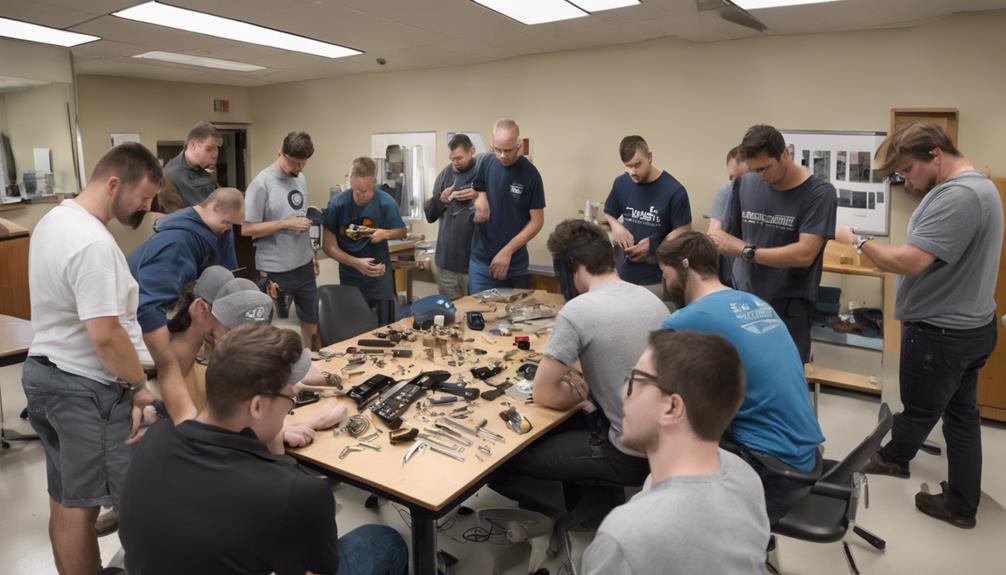
Locksmiths undergo specialized training to adeptly handle the intricacies of electronic locks. You might think picking a lock is just about twiddling some tools, but with electronic locks, it’s more like hacking into a mini Fort Knox. During their training, locksmiths dive deep into the mechanics and tech behind these modern marvels. They learn not just to troubleshoot, but also to repair the high-tech fortifications that stand between you and your snack stash during a midnight munchies raid. Challenges like complex programming and limited access? No problem. These tech-savvy magicians are trained to tackle them, ensuring you’re never left out in the cold—or out of the pantry. So, next time your electronic lock decides to go rogue, you’ll know who to call!
Understanding Electronic Locks

In order to understand how electronic locks enhance security and convenience, one must grasp their operation, which relies on electric currents or signals to activate the locking mechanism. Imagine your lock deciding to play gatekeeper based on electricity – kind of like your moody cat deciding when you can enter the pantry! These nifty gadgets can be tickled open with key cards, fobs, PINs, or even your fingerprint. Talk about feeling special! Locksmiths have to cozy up with specialized tools and techy know-how to keep up. They’re not just twisting metal keys anymore; they’re programming and troubleshooting like some kind of door-whisperers. So, next time you swipe that card, remember there’s some serious wizardry keeping your snacks safe!
Skills Required for Electronic Locks

As you’ve seen how electronic locks operate, let’s explore the specific skills locksmiths need to master these systems. Diving right into the world of electronic locks, locksmiths must not only understand the mechanics but also get comfy with the tech behind these modern marvels. We’re talking keyless entry systems and access control that make traditional keys look like ancient relics! To keep things running smoothly, they need specialized tools and techniques up their sleeves. Picture them troubleshooting and fixing issues like a tech-savvy wizard, all while managing the art of manipulating locks without the old-school key turn. It’s a blend of tech know-how and nimble fingers, ensuring they can tackle any hiccup in this key-free wonderland!
Tools and Technology Used
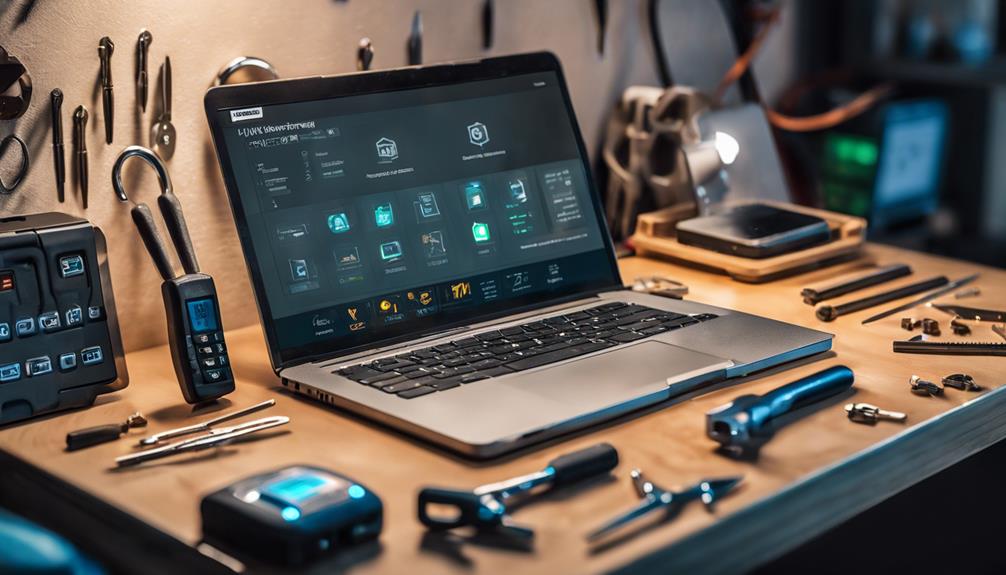
To efficiently diagnose and resolve issues with electronic locks, locksmiths employ specialized tools such as keypad and battery testers. Ever wondered what a locksmith carries besides a charming smile and a hefty bill? Well, it’s not just lock pick guns and decoder tools, which might sound straight out of a spy movie, but these gadgets help them bypass your high-tech fortresses when you’re locked out. Denver locksmiths, in particular, come equipped with an arsenal adapted to conquer the complexities of these modern marvels. These tools aren’t just fancy paperweights; they’re essential for efficiently handling those pesky electronic door lock issues that can really lock up your day! So next time, appreciate the wizardry they perform with their specialized tools!
Installation of Electronic Locks
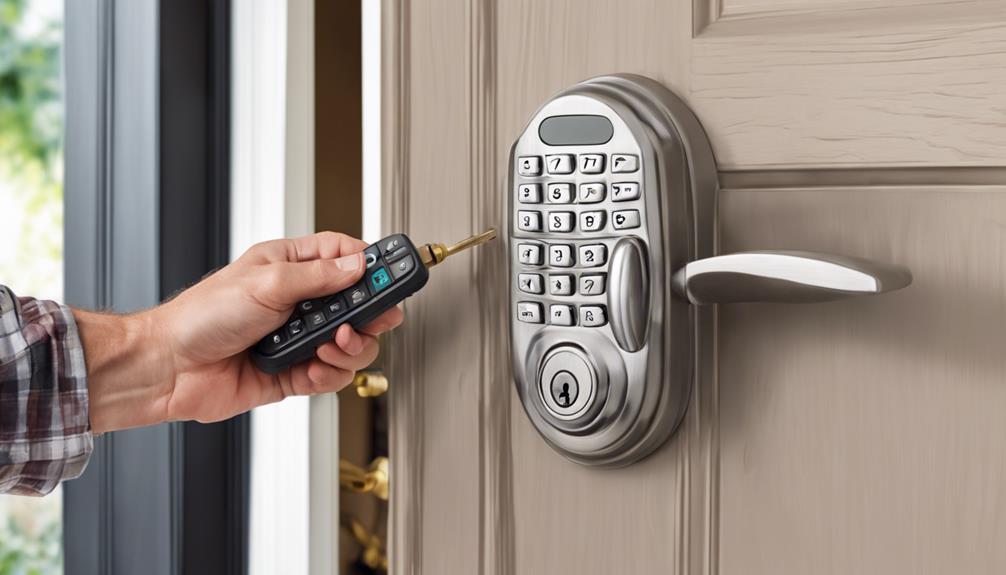
When you choose a locksmith to install your electronic lock, they bring specialized training and tools to guarantee the job is done right. Locksmiths aren’t just old-school key janglers anymore; they’re tech-savvy wizards with the skills and knowledge to navigate the labyrinth of wires and programming that make up your fancy new electronic lock. Their training guarantees that the installation of electronic locks is not just about screwing in a few bolts but integrating complex security systems seamlessly into your home or business. They follow strict industry standards, so the only thing you’ll need to worry about is remembering your new passcode, not whether your door will swing open to any slight breeze!
Troubleshooting Electronic Issues
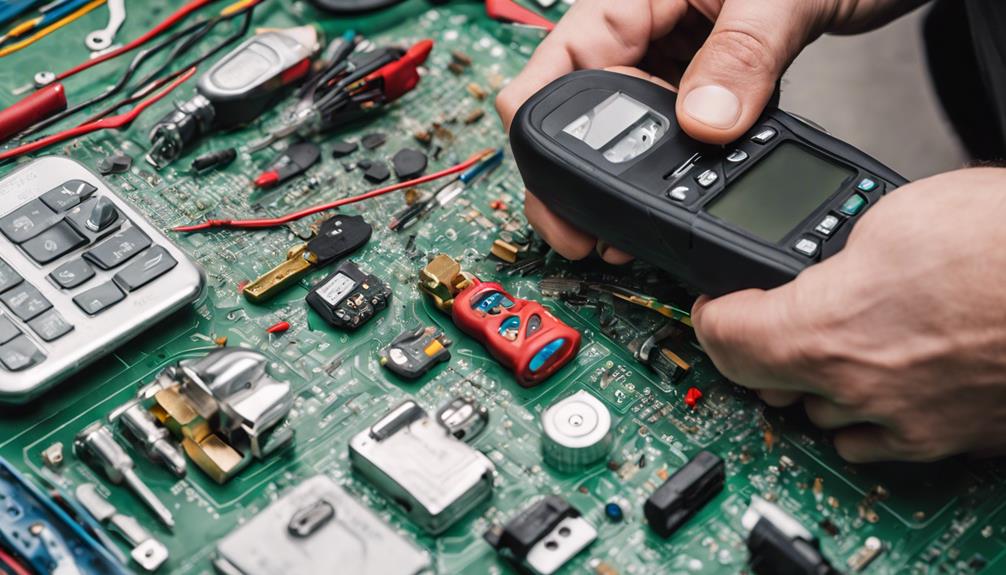
When you’re facing issues with your electronic locks, the first step is to identify common error codes that can pinpoint the problem. You might need to reset the electronic lock systems to clear any glitches and restore functionality. Additionally, maintaining battery health is vital to make certain your locks operate smoothly without unexpected failures.
Identifying Common Error Codes
Understanding common error codes such as ‘Low Battery,’ ‘Communication Error,’ ‘Invalid Key,’ ‘Lock Jammed,’ and ‘System Malfunction‘ is essential for effectively troubleshooting electronic lock issues. When your lock flashes ‘Low Battery,’ it’s not just being dramatic; it really needs those batteries swapped out pronto to keep guarding your treasures. A ‘Communication Error’ might feel like your lock is giving you the cold shoulder, but it’s actually a hint to check the connection with its control system—perhaps it needs a little discussion with specialized tools. ‘Invalid Key’? Time to delve into key programming. It’s like telling the lock, ‘Hey, we’re buddies, remember?’ So, grab your troubleshooting toolkit and show these error codes who’s boss!
Resetting Electronic Lock Systems
If your electronic lock isn’t functioning correctly, resetting it might be the necessary step to resolve the issue. You might think you’d need a magic wand, but actually, you just need a professional locksmith. These wizards come equipped with specialized tools like lock picks and tension wrenches, not just to show off, but to get deep into the lock’s mechanics without turning your door into modern art. They use techniques like lock bumping or decoding—sounds like spy stuff, right?—to effectively recalibrate your stubborn electronic lock systems. Choosing an experienced locksmith isn’t just a good idea; it’s essential. They make sure your lock’s antics are tamed, making it behave and secure your fortress once again.
Maintaining Battery Health
To guarantee that your electronic lock functions reliably, regularly check and maintain the battery health. Don’t let a dead battery lock you out of your house—literally! Locksmiths bring their expertise to the table, using battery testers to figure out if your electronic lock’s malfunction is just a cry for battery help. Keeping those batteries healthy isn’t just about avoiding getting stuck outside in your pajamas. It guarantees your lock’s smooth operation and your home’s security. So, if you notice your electronic lock acting up, it might just be pleading for a battery check-up. Let a locksmith with the right know-how give those batteries a good once-over to keep everything running smoothly.
Case Studies and Examples

Let’s explore some real-life scenarios where locksmiths have effectively handled electronic lock challenges. Imagine you’re locked out because your smart lock decided to play dead battery blues. Enter our hero locksmith, armed with a decoder tool and a cheeky grin, who diagnoses the drama in no time. Locksmiths have the expertise, using specialized tools, ensuring the security of your fortress remains uncompromised. In another instance, a business faced a security nightmare when their access system went haywire during a holiday. Thanks to a skilled locksmith with a knack for complex programming, the crisis was averted before you could say “locked out!” These pros really know how to crack the code, literally!
Benefits of Professional Locksmiths
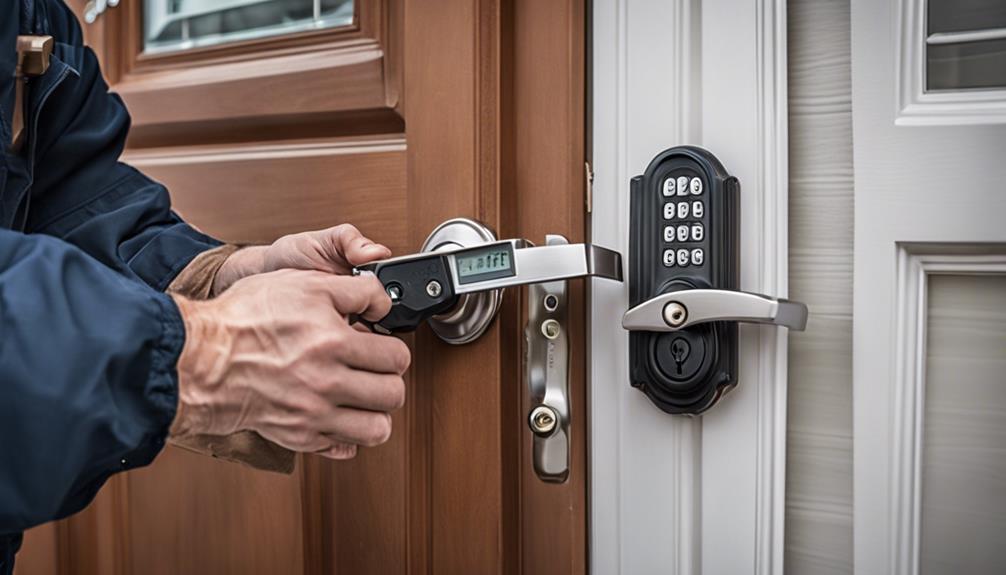
Professional locksmiths offer invaluable expertise in swiftly diagnosing and resolving common electronic lock issues, guaranteeing your security system remains robust and reliable. When you’re locked out, they’re not just your heroes; they’re your ultra-skilled, tool-wielding saviors. With specialized tools in their belt, locksmiths are trained to tackle the trickiest types of locks without breaking a sweat.
| Benefit | Description | Impact |
|---|---|---|
| Expert Diagnosis | Quick identification of issues | Saves time and reduces stress |
| Specialized Tools | Equipped with the latest gadgets | Ensures effective solutions |
| Versatility | Skilled in various lock types | Addresses diverse needs |
| Maintenance Proficiency | Regular upkeep and fixes | Extends lock lifespan |
Contacting Low Rate Locksmith

If you’re facing issues with your electronic locks, contacting Low Rate Locksmith can provide you with expert and efficient solutions. Now, let’s say you’re locked out of your high-tech fortress—fear not! These folks are not just any locksmiths; they’re like the tech-savvy wizards of the lock world. They’ve got specialized training in the mystical arts of electronic locks, be it keypads that play hard to get or biometric systems that have forgotten who you are.
When you reach out to them, you’re not just gaining access to your space but tapping into a treasure trove of knowledge on all types of electronic locks. So, why wait? Resolve the solution to your lock woes with a quick call!
Frequently Asked Questions
Can Locksmiths Integrate Electronic Locks With Home Automation Systems?
Yes, locksmiths can definitely integrate electronic locks with your home automation systems. They’re trained to guarantee that your electronic locks work seamlessly with other smart devices like lights, thermostats, and security cameras. This not only boosts your home’s security but also adds a layer of convenience, allowing you to control everything from one platform. Locksmiths handle both the installation and any troubleshooting, making them your go-to for modern security solutions.
Do Electronic Locks Increase Home Insurance Premiums?
Here’s a fun fact: 34% of homeowners are beefing up their home security! You might wonder if adding electronic locks could bump up your insurance premiums. Actually, it’s the opposite! These high-tech locks often lead to discounts because they strengthen your home’s security. Be sure to chat with your insurance provider, though; they’ll give you the lowdown on how these gadgets could shave dollars off your policy. No premium hikes here, just savings!
Are Older Electronic Locks Still Secure?
If you’re dealing with older electronic locks, you might want to think twice about their security. While they may have been excellent back in the day, technology moves fast, and what was secure then might not cut it now. They can be more susceptible to hacking and less reliable. Upgrading to newer, more secure models is often a smart move, and many locksmiths can help assess and upgrade these systems for you.
How Do Locksmiths Ensure Client Data Privacy With Smart Locks?
To guarantee your data privacy with smart locks, locksmiths adhere to rigorous confidentiality protocols. They utilize encrypted communication and secure data storage to protect your sensitive information. Additionally, they’re trained in data protection laws and employ best practices like two-factor authentication for system access. Regular software and firmware updates are a priority to prevent breaches, guaranteeing your data is safeguarded against unauthorized access at all times.
What Are the Environmental Impacts of Disposing Old Electronic Locks?
Ever thought about where your old electronic locks end up? Disposing of them improperly can cause serious environmental harm. These gadgets often contain toxic substances like lead and mercury that can contaminate soil and water. Recycling at certified e-waste facilities is your best bet, allowing recovery of valuable materials and reducing ecological damage. Remember, chucking these locks in the bin isn’t just bad form; it’s bad for the planet!









